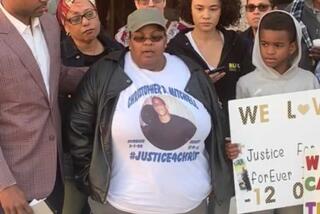D.A. Forgoes Death Penalty for Tuffree
- Share via
Prosecutors have decided not to seek the death penalty in the retrial of Daniel Allan Tuffree, the 49-year-old former high school teacher accused of killing a Simi Valley police officer last year.
The decision was announced late Thursday and came three days after Tuffree’s lawyers indicated that they were willing to waive a second jury trial if prosecutors agreed not to ask for the death penalty.
“We thought about it and considered what we learned from the interviews with the jurors and felt this would be a fair and reasonable outcome,” Deputy Dist. Atty. Pete Kossoris said. “It will bring some closure to the case.”
After a six-week trial that ended in October, a jury deadlocked on whether Tuffree committed first-degree murder when he shot Simi Valley Police Officer Michael Clark to death last year.
Clark was one of three officers sent to Tuffree’s home Aug. 4, 1995, after reports that Tuffree was possibly suicidal and had stopped answering his phone.
During his trial, prosecutors argued that Tuffree hated police and grabbed his guns with the intent to kill when he saw officers entering his backyard that afternoon.
But defense attorneys argued that Tuffree initially hid from police and only shot Clark after the officer allegedly fired at him.
Nine jurors sided with the prosecution’s theory, voting to convict Tuffree of premeditated, first-degree murder. But three others held out, arguing they were not convinced Tuffree had planned the killing.
The jury did agree to convict Tuffree on two lesser charges of armed assault and attempted murder for firing at another officer.
The impasse on the murder charge forced Superior Court Judge Allan Steele to declare a mistrial. Tuffree will not be sentenced on the other convictions until the murder charge is resolved.
Jury selection was set to begin Monday for Tuffree’s retrial. But now that attorneys have agreed not to pursue the death penalty, Tuffree is expected to waive his right to a jury trial at a hearing this morning. That would mean Steele could decide the case after a shorter court trial, in which he decides the questions of guilt or innocence.
“I don’t think it would take longer than three weeks,” Kossoris said. “It is certainly going to be a fraction of what a jury trial will take.”
Deputy Public Defender Howard Asher said he made the offer Monday to waive a jury trial after discussing it at some length with Tuffree.
“It is my obligation in any type of capital case to do whatever I can to eliminate the death penalty as a consequence,” he said.
Asher said he was surprised the district attorney’s office agreed to the offer, but said it made sense given the statements of jurors from the first trial.
“We interviewed the majority of the jurors and even those who thought this was a first-degree murder case did not believe it was a death-penalty case,” Asher said. “I think it was the right decision.”
Simi Valley Police Chief Randy Adams disagreed, but said he would support the district attorney’s action. Clark, 28, was the first officer killed on duty in the department’s 24-year history.
“Certainly I, personally as well as the department as a whole, would have liked to see Daniel Tuffree receive the death penalty for the murder of Michael Clark,” Adams said.
“However, our understanding is that with the agreement to drop the death penalty, it will simply be a court trial in front of Judge Steele,” he said. “And if that occurs, my understanding is that instead of this being another several months ordeal, it will be reduced to a matter of weeks.
“We have the utmost confidence in the D.A.’s office, and if they feel this is the correct course of action, we’ll support that.”
Members of Clark’s family also said they supported the decision not to seek the death penalty. Bill Clark, Michael Clark’s uncle and best friend who attended nearly every day of testimony in the first trial, said prosecutors consulted the family before making the decision.
“My brother met with the D.A.,” he said. “He told them that he wanted to talk to us first, in which case we looked at the options.”
If Tuffree is convicted of first-degree murder, he must receive a mandatory sentence of life without the possibility of parole.
And contrary to the death penalty, that would mean the family would be spared years of appeals that would bring back painful memories, Clark said.
“We realize the death penalty is just a bunch of words,” Clark said. “It doesn’t mean he is going to die. We may see it go through appeals for the next 20 years. That is more tugging than if he had life imprisonment without parole.”
More to Read
Sign up for Essential California
The most important California stories and recommendations in your inbox every morning.
You may occasionally receive promotional content from the Los Angeles Times.












